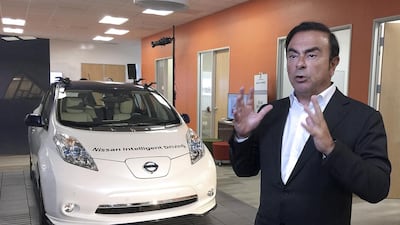The dismissal of Nissan chairman Carlos Ghosn following allegations of financial misconduct has raised questions about the fate of the alliance between the Japanese car maker and its French partner Renault. The world's biggest car alliance faces its toughest challenge to date after the arrest of its industry maverick.
Why were Carlos Ghosn and Greg Kelly arrested?
Tokyo prosecutors on November 19 arrested Nissan's ex-chairman Carlos Ghosn and his aide Greg Kelly on suspicion that they conspired to under-report the ex-chairman's pay in securities reports and misused company funds.
Mr Ghosn faces allegations of using company resources to acquire homes in Amsterdam, Paris, Rio de Janeiro and Beirut, according to Japanese media.
The media reported that Nissan had been paying Mr Ghosn’s elder sister $100,000 (367,300) a year since 2002 for a non-existent advisory role. She lived in a luxury apartment in Rio de Janeiro funded by a Nissan subsidiary, according the report.
Mr Ghosn is suspected of breaking the Financial Instruments and Exchange Law, which could result in a sentence of as much as 10 years, Shin Kukimoto, deputy chief prosecutor at the Tokyo District Public Prosecutors Office, said on Thursday.
What have the executives said since their arrest?
Both executives have denied the allegations brought against them.
During questioning Mr Ghosn told prosecutors in Tokyo that he had no intention of under-reporting his earnings in the company's securities reports, Japanese public broadcaster NHK said. The executive has not spoken publicly since his arrest.
Nissan's ex-representative director Mr Kelly defended the payment of Mr Ghosn's income, saying it was discussed with other officials and paid out appropriately, NHK reported.
What do the the legal proceedings mean for the Nissan-Renault alliance?
Hours after Mr Ghosn's arrest last week, the Japanese and French finance and economy ministers met to pledge support to the alliance. The placating tone of the politicians makes the danger of either company trying to take over the other less likely for now. However, the relationship between the two car makers is now fragile after the bonds of trust were shaken from past week's events. The alliance was expanded to include Japan's Mitsubishi in 2016.
The complex dynamic between Nissan and Renault is further complicated by the removal of Mr Ghosn who, prior to his arrest, had planned to cement the collusion through a full merger of the companies. The move was resisted by Nissan chief executive Hiroto Saikawa, who is seeking more power for the Japanese side in the partnership, which he views as too skewed in favour of the French, media reported.
The end of Ghosn's leadership of the world's biggest car alliance comes at a difficult time for the industry, which is struggling with tougher emissions regulations and a shift towards major investments in electric and self-driving cars.
Who is running Nissan and Renault?
Renault has selected its chief operating officer and a senior board member to fill in for Mr Ghosn. Thierry Bollore, the Mr Ghosn's operational second-in-command, will become deputy chief executive, while lead independent director Philippe Lagayette will take the function of interim chairman.
Nissan has appointed Mr Ghosn's protege and chief executive Mr Saikawa as interim head.
Reuters reported that Nissan aims to nominate a new chairman before its December 20 board meeting.


